By: debbie lynn elias
Michael Biehn and Jennifer Blanc-Biehn are easily my favorite “Hollywood” couple. As far from the trappings of Hollywood glamour as you can imagine, Michael and Jennifer are genuine, refreshingly open and honest, both individually and as a couple, and are a beyond a delight and inherently nice. There is a welcoming sincerity and comfortable easiness between the couple which osmotically extends to those around them. And it is because of this dynamic that makes it easy to understand the sensibility of a professional pairing between them as well. While many couples who try and mix business with pleasure generally fail, with Michael and Jennifer there is a tacitly organic give and take that not only works, but makes everything they touch thrive. It’s that magic that brings us THE VICTIM.
Written and directed by Michael and starring Michael and Jennifer with Jennifer also serving as producer, THE VICTIM has the touchstones of a 70’s thriller with a grindhouse touch buttressed by a purposeful story, interesting characters and effective visual imagery. I was fortunate enough to be with the couple in January when they learned that Anchor Bay had purchased their film for distribution. Their excitement was contagious and I, for one, couldn’t wait to see what they were bringing to the screen. As we sat together initially to discuss THE DIVIDE, another film in which Michael stars and was promoting that day, Jennifer was literally busting at the seams with emotion over the news on THE VICTIM which they had received less than an hour earlier. Well known in front of the camera, THE VICTIM is Michael’s freshman foray behind it as a writer/director.
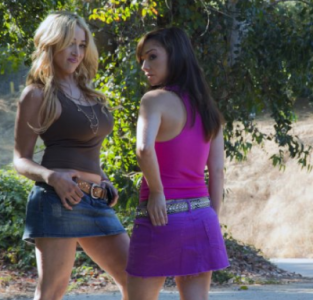
A taut suspense thriller with a sexy edge, as THE VICTIM opens, we meet Annie and Mary who are out in the woods hooking up with two sheriff’s deputies out for a little R&R. But as we quickly learn, our boys in undercover polyester are anything but fine upstanding law enforcement officers as an afternoon nature romp turns into a life and death situation. Running from the “law”, Annie stumbles upon Kyle. A crotchety loner with no love loss for civilization or people, Kyle hides from the world in his remote cabin in the woods. With an hysterical Annie pleading for his help, Kyle finds it impossible to turn his back on this buxom damsel in distress and soon finds himself plunging head first into a world and dangers he would just as easily have left behind.
Joyously, now that THE VICTIM has come to theatres and DVD, neither Jennifer nor Michael has lost that “Christmas morning exuberance” that I witnessed nine months ago; in fact, I think it’s only increased as I learned during my interview with them the other day. Synergistic in their philosophies with a yin and yang approach, the two complete each other, drawing on each other’s strengths and offsetting any individual weaknesses. They are a wonderful couple and wonderful dynamic to watch unfold. Forthright and honest, and both humble almost to a fault, nothing was off limits as we talked about THE VICTIM, the future and who’s the boss on set – director Michael or producer Jennifer.
JB: We’re so excited that you were there because, as you know, that was a really great day for us. One, Michael getting to share about Xavier’s [Gens] fantastic directing [on THE DIVIDE] and then having that news come out with the same company [Anchor Bay] that he was promoting that film for. It was a good day. . .I was definitely jumping out of my skin all morning!
Having now seen THE VICTIM, I say with all sincerity that you both have every right to jump out of your skin. Technically and from a directorial standpoint, Michael, you have done an exemplary job. I am so impressed with what you‘ve done in terms of your camera operation and angles, your points of view. How did you go about developing that tonal bandwidth and look because it shows your experience in front of the camera, so I’m curious how you translated that behind?
MB: I had the help of a lot of people. I think my strong suit as a director is writing, working with actors, blocking scenes and knowing when things don’t feel right. I think I’m a good editor. I think I’m a good post-production guy in sound and visual and so on and so forth. I’ve never really had a lot of confidence of where to put the camera and when the camera should be moving. We didn’t have very many resources as far as where the camera goes…We had an indie rig and most of the movie was shot on that. I think that what happened is that when you have a good story and you have actors that are playing those characters and theyfre playing them well, the rest of it just kind of works. You don’t pay attention to the rest of the movie.
One of the things that we did that I think works beautifully for the movie is that we shot it day for night. We basically shot the movie from 6 in the morning until 6 in the evening and then through the magic of moviemaking, they turned it into night in the lab. I think it made the nights all very interesting and different and gave it a good look. I told the guys that I wanted a throwback feel to it. Even my cell phone and my B&W in a shot, which I wish I didn’t have, I kinda wanted it to be timeless. Kind of a 70’s, 80’s kind of vibe. I asked my guys – the cinematographer and the guys at the visual effects house – to create that for me and they did. So I can’t take any credit for that.
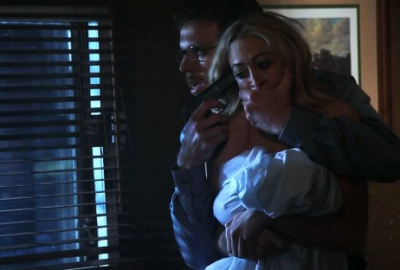
It‘s a fantastic look that you have created and I know a lot of that is due to your cinematographer Eric Curtis. As far as your timelessness, that‘s one of the first things that I noticed, especially in Ryan‘s [Honey] and Denny‘s [Kirkwood] characters. From the hair and make-up to the costuming, I was immediately transported back into a 70’s Mannix or 80’s TJ Hooker kind of vibe. It really felt so “right” with the storyline.
MB: We didn’t want to make anything – and we didn’t have the capacity to make anything – that was technologically sophisticated. We were doing 45 set-ups a day. We would have one wardrobe fitting. No rehearsals. We just shot from the hip here. If it has a certain look and has a certain feel to it, I think some of it has to do with we just got lucky. The film gods kind of helped us out. I say on the extras, The Making Of, there’s something about the movie that it just felt like we had an angel on our shoulder and we re able to get through these 10 page days every day for 12 days without ever running into any real obstacles. Did we have obstacles? Yes. Did we have problems? Yes, but we were able to overcome them.
[W]hen we made this movie, it was just this little movie. If anybody knew how much we made it for, you would just be shocked. I didn’t ever really expect it to do anything other than zip over to Netflix and play on Netflix. And the fact that it’s gotten so much attention and the fact that we’ve showed it in like 30 different cities, and all over Europe, and that it’s being reviewed by the New York Times, its like “WHAT?” While I was making the movie, I was telling people, “Oh, don’t worry about that. No one’s ever gonna see this on a movie screen. They’ll be watching it on their telephones.” I remember saying that over and over again to people who were making sure everything was just perfect. The whole thing has just been completely overwhelming. It’s like a snowball. It just keeps getting bigger and bigger and bigger. And then we sold to Anchor Bay. I’m more surprised than anybody that it’s had the success that it has had. I just can’t believe it! People really seem to love it. I’ve seen it with probably 20 audiences and there hasn’t been one audience – I think it’s better, of course, when you see it with an audience – out there that I’ve seen it with that I didn’t think was really into it. I could hear them. Clap and laugh. I could hear them. I could watch them. I could watch their faces. I could tell when they were into it and out of it and so on and so forth.
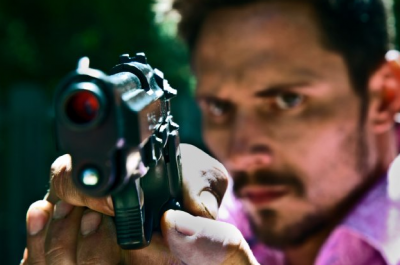
There seems to a “new model” for moviemaking today and THE VICTIM falls into the specs for this model. The smaller films seem to have more heart and that heart that goes into making them really translates into the final product on screen. Audiences gravitate toward that and they will hold onto that.
JB: Yea. So many movies today are little movies and it seems to be the new model. We were talking about that on Adam Corolla the other night and he was also of that thought process. It seems to be a new era. For example, Ross Dinerstein who has made movies for years and he’s very successful at it – he made THE DIVIDE, he produced it – his company helped us sell THE VICTIM to Anchor Bay. . . He said, “I saw what you guys did and I wanna part of that. I wanna start doing that. It’s definitely the new way to do things.” And now, I think all the movies they’re making over there are that size. I think there’s going to be more and more people doing it. I know Michael’s manager and I had a conversation about it. [S]he was even saying, she came over to watch what we were doing with Treachery and she was like, “This is definitely the new model. We’re paying a lot more attention to these little movies in our office than we used to. We used to kind of look at them and go, ’Oh, it’s one of those.’ Now it’s more like, ’Oh! It’s one of THOSE!”
Being “one of THOSE”, I think you’re also paying a lot more attention – and I see it with Michael‘s script here – to the story in these smaller models as well. There‘s no reliance on car chases, blow-ups, explosions and all of that. There’s actually story and character which is something that also stands out.
JB: I know. That’s Michael’s pet peeve or something that he firmly believes in is,a good story is a good story.
MB: I always feel that if you have a good story that you will attract talent around that story. Usually a good story has good characters and of course there’s a million actors out there that want to play those characters. There’s always a million directors who want to direct that good story. It attracts good people. Usually you can get them at a lower price if you have good material. If you have good material you can get them at a lower price because they are prouder of the work. The same thing with me as an actor. All my life, I’ve always done all my big movies for not very much money. It’s always been the little stinky bad ones – the ones that were bad for my career – that paid me a lot of money.
[With THE VICTIM] I think that we had a nice crisp, clean little story here, not complicated, easy to follow, good guys – bad guys. I like the one bad guy who wasn’t really quite as bad – the reluctant villain – I like that idea that these are people. This other guy is trying to save his career and his marriage and his life and so on and so forth. I think you can understand those two characters very well. Of course, Annie [Jennifer’s character]. I think the only real kind of “Who is this guy?” is me and I think we wanted to keep it that way right up until the end of the movie.
That‘s one of the things that I really loved about your performance. You really drew me in and I kept trying to figure out, “Who are you? What is your agenda?” You walked that fine line and it plays so well into the tautness of the story.
MB: [That’s] one of the things that I tried to, other than to entertain people. But I think if this story has any kind of lesson to it is that men, powerful men, will jeopardize everything – 20, 30 years of work – for sex under the wrong circumstances. Also, that women can use their sexuality to manipulate men. Kyle’s like every other man. If you noticed, when [Annie] starts coming on to him, he’s saying, “Well, let’s go to this place. Let’s go to the FBI. Let’s go to the CIA.” and she says, “Well, how old are you?” She changes the subject and turns it into a sexual situation and he’s no longer talking about [the crime] any more and he knows what’s going on. There aren’t that many men, when you have a woman that looks like that standing in front of you offering herself up to you, willing to say no.
Let‘s talk about the two of you working together. Jen is acting. Michael, you’re directing her. She‘s also your producer and technically, your boss, so how did this dynamic work for the two of you and Jen, how would you describe Michael as a director?
JB: Michael is a fantastic director.
I say this on the [DVD] extras, too. I wish he would be on set with me all the time when other directors are directing me [laughing] because I just trust him implicitly. He’s like a truth meter. You will get a straight answer from Michael. He doesn’t beat around the bush. He can tell you exactly what he wants and can do it quickly. As far as me being the boss, yea, we had some knock down drag-outs of me trying to convince him and him being exhausted by me trying to convince him of certain things for the movie. [laughing] Some of the time I got my way, but most of the time it went with his decision-making process. He was usually right because he’s been doing this for way long than me even though I’ve been doing it awhile. The only way that we agreed to start this company was to have a partnership. He has a specific career to live up to and there’s a lot of money on his name and therefore he needed to have the contract that said that final decision, final cut, end all-be all stuff, was with him. And I’m fine with that because I trust him.
Conversely, Michael, how well does your actress take direction when you give it?
MB: It’s about 50-50. [laughing]
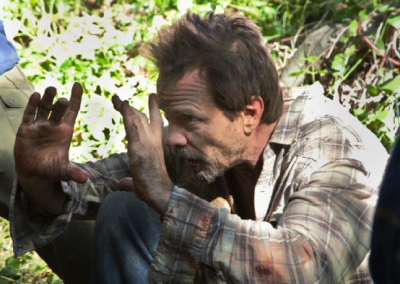
Now that you‘ve stepped behind the camera and you’ve brought this whole thing to fruition, in looking back on the process, what is the greatest gift that directing now gives you?
MB: I have to tell you that other than having four beautiful boys and raising four beautiful boys, that I believe that this film is the greatest accomplishment of my life, working life. Yes, I’ve been Johnny Ringo and yes, I’ve done Terminator as Kyle Reese, and Hicks, and everybody loves me for all that stuff, but this personally was war. It was a war that I felt was truly a war and I was the general on one side and it could have gone good and it could have gone bad. I felt like I stepped up and picked the right people to surround me, to support me, and I’m just very very proud of the fact that I did it. And I don’t want to ever do it again like that under those circumstances. [laughing]
What‘s the greatest thing you learned about yourself during the process that surprised you?
MB: I’m a passionate person. Well, no, I kinda knew that about myself. . . I guess I learned that I should take more chances in life. I’ve had a chance to direct movies in the past and turned them down for various reasons and I think mostly it was because I was afraid of the reaction and rejection of making a bad movie. I think that I probably learned more than anything else by making THE VICTIM and by Robert Rodriguez’ advice which is, “Just go ahead and do it. Don’t think about. Don’t worry about it. Don‘tcare about anybody else thinks. Go make it for yourself.”

In the same vein, Jennifer, what did you learn about yourself in this process of producing and being an emotional first lieutenant to Michael and the co-star?
JB: I learned that I‘m a good multitasker. I also learned that I really enjoy producing which, who knew! But, there are definitely some things about me that I’m learning as I go and I think they have to do with my wanting to control things. You can’t always control things. I‘m learning also how to communicate with different people in different ways. I started off communicating with everybody from the same point of view and same sort of urgency. Through producing I’m learning that you have to learn who you’re dealing with and approach them from different points of view based on where they’re coming from. That’s a huge lesson for me not only as a producer, but also as an actress because that is part of the listening and giving and taking, and also just as a human being. I think eventually that’s going to help me a lot instead of kicking and screaming. [laughing]
I’m also learning, probably in a weird way, working together under this circumstance. You really learn intensities about yourself as people in a relationship when you work together and you are also together as a couple.
Jennifer, do you see yourself now moving more towards the producing end of film as opposed to acting?
JB: I’m an actress, first and foremost. [chuckling] I’ve got two other movies I did this year as an actress. But I say that and yet I’m still producing, and they keep coming and they keep wanting me to produce. So, I’m gonna say it’s probably going to be split down the middle.
I hope it continues for both of you because I think you just did an amazing job. I want to see more of Michael‘s work as he did such a great job directing this film that I think he‘s got some great stuff to offer everyone behind the camera.
MB: I take that as quite a compliment. I think the film gods were on our side and I think that I picked a lot of good people to work with me, Jennifer and we had a good cast and a great crew and a lot of people that were willing to work just for kinda the thrill of making movies. I think making movies is an art. Itfs like painting. It’s like writing. I think that people enjoy doing it. I certainly do. I will try to bring more fun and action and anything that I can to the screen that I can! But I’m getting old, I’m wearing out! [laughing]
JB: Not that old. You just need a little rest.
MB: I don’t understand how Clint Eastwood and…
JB: Robert Redford? Scorsese?
MB: Well, all of them. And Ridley Scott. I don’t know how these guys that are in their 80’s do it. They probably just walk in, they’ve had their crew for 20 years. They just walk in, sit down and say action. Where me, I’m the first one there and I’m cleaning the set and doing set design. Maybe in the future I’ll be able to lighten my load a little bit as far as the work goes and just direct more. Thank you so much for the compliment. It means a lot to me. Like I said, I never really expected to make anything other than a fun little, comic book kind of grindhouse movie, pulp fiction kind of fun movie and I really appreciate your compliments.
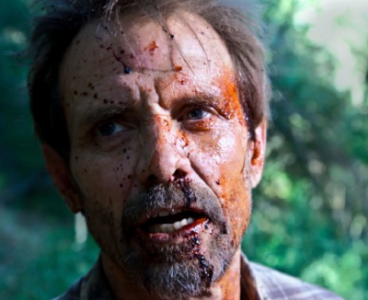
Just no more police chokeholds! We really don‘t need you passing out on the set or worse! I know you love doing your own stunts, as you did here, and as you always have, but there comes a time when you‘ve got to ease up a little bit so that you can continue to bring us more entertainment for years to come. [As revealed by Michael in the DVD extras, a particular scene requires him to be subdued by a chokehold. With everyone doing their own stunts and Michael always wanting authenticity, he instructed his co-star to use an actual LAPD chokehold on him from which he actually passed out.]
MB: No more LAPD chokeholds! I promise. You have my word. I will ease up – “a little.”
THE VICTIM is currently in theatres and available on DVD and Blu-Ray. Notable is the DVD/BR extra featurette on The Making of… which includes behind the scenes footage and commentary giving the audience a better understanding of just how hands-on and involved Michael Biehn is when helming a project.
#












